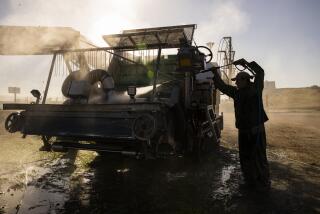Minimizing the Necessary Evil of Food Pesticides
- Share via
Dear Dr. Blonz: I think many people today regard chemical pesticides as a necessary evil. They are needed to protect fruits and vegetables from being destroyed by insects, but we are also aware that the ingestion of certain levels of pesticides can cause serious illnesses. We are advised to wash our fruits and vegetables, but does this give us a false sense of security?
--F.M.
Linden, N.J.
Dear F.M.: You can appreciate the role of pesticides by thinking of agriculture as an ongoing struggle between farmers and unwanted insects, weeds and fungi--each intent on reaping the harvest for its own ends. With the coming of modern farming techniques, though, the farmers could tilt the scales in their favor with the use of synthetic pesticides, a term that refers to the agrichemical arsenal of insecticides, herbicides and fungicides. It was an important development that helped to dramatically increase farm output--but these are powerful chemicals that need to be closely monitored.
The Environmental Protection Agency regulates the level of pesticides in foods by assigning “tolerances”--the highest amount of a particular pesticide allowed in a food. The data used to assign a tolerance comes from research on the safety of a chemical, which is usually performed by the company that manufactures and sells it. After the tolerance is established, it’s up to the Food and Drug Administration to take random samples of fresh fruits and vegetables, and check for violations of the EPA tolerances.
There’s little question that it’s more healthful to eat fresh fruits and vegetables. In fact, all individuals--especially children--need to eat more, not less, of these nutritious foods. I think it is important to appreciate that our produce markets are not hazardous places where we need fear every bite.
So what’s the bottom line? Does all this mean that conventionally grown fruits and vegetables are unsafe to eat? Definitely not, but the system does need to change. This point was recently emphasized when, in an important policy shift, the FDA, the EPA and the Department of Agriculture jointly announced their commitment to reducing the use of pesticides in the American food supply.
In the meantime, here are some common-sense steps that may help reduce the level of risk:
* Wash your vegetables.
* Peel the produce whenever there’s a wax coating.
* Grow your own fruits and vegetables if possible.
* Buy produce grown locally or regionally. Those grown in other countries are not necessarily held up to the same level of scrutiny.
* Shop at farmers’ markets whenever possible.
* Consider buying certified organic fruits and vegetables, or those produced on a farm that uses Integrated Pest Management (IPM), a method that attempts to limit the use of synthetic chemicals whenever possible (although they remain a part of the farmer’s arsenal to be called upon when needed).
* If organically grown or IPM products are not available, speak with the produce manager.
*
Ed Blonz is the author of the “Your Personal Nutritionist” book series (Signet, 1996). Send questions to: “On Nutrition,” Ed Blonz, c/o Newspaper Enterprise Assn., 200 Madison Ave., New York, NY 10016 or e-mail to: ed@blonz.com. Personal replies cannot be provided.






